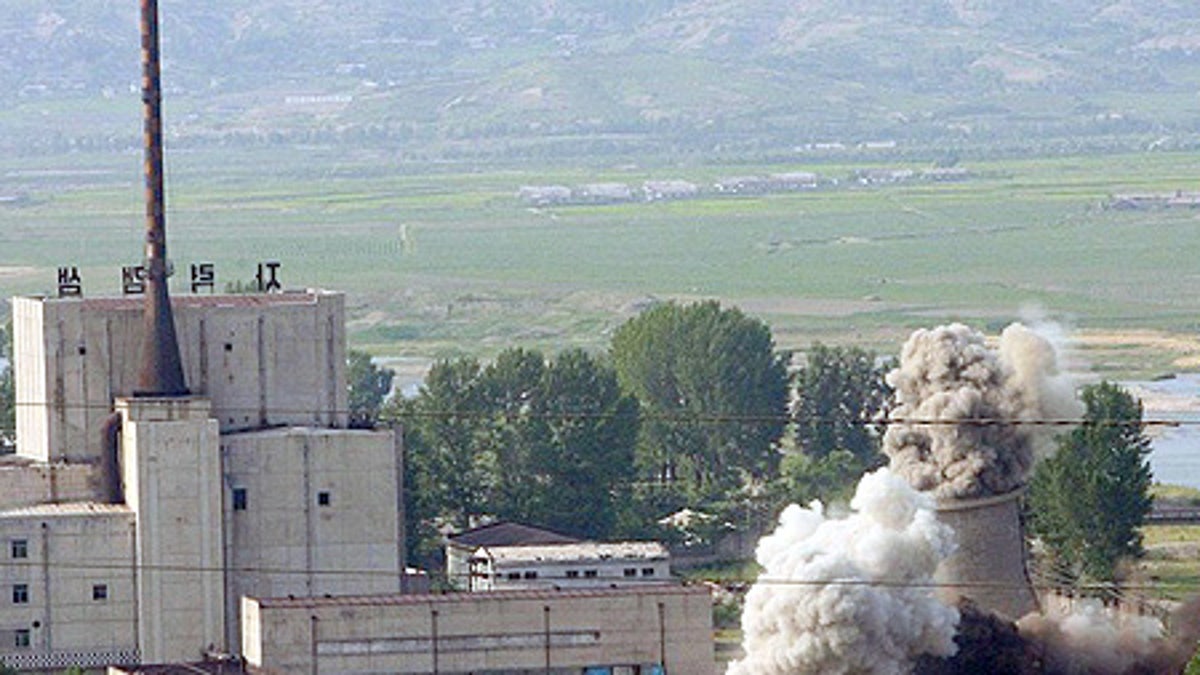
File: The cooling tower of North Korea's Yongbyon nuclear complex, a plutonium-producing reactor, was demolished on June 27, 2008. (Reuters)
SEOUL, South Korea – North Korea noted Friday that Russia "paid attention" to its decision to boycott international nuclear talks when their top diplomats met, indicating there was no breakthrough in Moscow's efforts to get Pyongyang back to the negotiating table.
North Korea last week expelled international nuclear monitors, vowed to restart its atomic program and quit disarmament negotiations after the U.N. Security Council condemned its April 5 rocket launch and called for expanded sanctions.
Russian Foreign Minister Sergey Lavrov flew to Pyongyang seeking to persuade the North to return to the nuclear negotiating table, holding talks with Foreign Minister Pak Ui Chun on Thursday.
"The Russian side ... paid attention to the (North's) stand that there is no need to hold the six-party talks any longer," the Foreign Ministry said in a statement carried by the official Korean Central News Agency. The nuclear talks involve China, Japan, the two Koreas, the U.S. and Russia.
Lavrov told Russian media after Thursday's talks he did not anticipate a quick breakthrough in the nuclear dispute.
Pyongyang also said Russia recognized that every country has the right to launch a satellite into space and reaffirmed its opposition to new U.N. sanctions against North Korea.
That position appears to contradict Russia's support of the U.N. statement adopted after the rocket launch in which Moscow joined other Security Council members in denouncing the liftoff as a violation of a previous resolution barring the North from ballistic missile activity.
The North says the U.N. rebuke was unfair because the rocket was launching a satellite. But the U.S. and others believe it was a test of long-range missile technology and that nothing entered orbit.
Media reports had said Lavrov may also meet with North Korean leader Kim Jong Il. But KCNA later said Lavrov delivered a letter from Russian President Dmitry Medvedev to Kim via Pyongyang's parliamentary leader before ending his two-day trip to the North. That suggests a meeting with the reclusive leader did not happen.
KCNA did not elaborate on the letter's contents.
Video footage from APTN showed Lavrov holding talks with the parliamentary leader, Kim Yong Nam, posing for photos with him and then departing from Pyongyang's airport.
Lavrov was scheduled to arrive in Seoul later Friday for talks with South Korean Foreign Minister Yu Myung-hwan.
North Korea's relations with Moscow are not as close as they were during the Soviet era but remain cordial. Moscow usually avoids openly criticizing the North.
North Korea conducted a nuclear test in 2006, but agreed under a 2007 six-party deal to disable its main nuclear complex in Yongbyon in return for the equivalent of 1 million tons of fuel oil in aid and other concessions.
In June 2008, North Korea blew up a cooling tower at the plant in a dramatic display of its commitment to denuclearization. But the disablement came to halt a month later as North Korea wrangled with Washington over how to verify its past nuclear activities.
International Atomic Energy Agency chief Mohamed ElBaradei said earlier this week that North Korea could restart its nuclear facilities within months, which would allow it to produce weapons-grade plutonium.
A newspaper in Japan considered to be a mouthpiece for North Korea said Friday that Pyongyang will further harden its position as a nuclear power if the U.S. increases pressure on it.
The Choson Sinbo also said President Barack Obama's administration should make efforts to dispel North Korean distrust toward it if it doesn't want to push Pyongyang toward another nuclear test.
"Denuclearization on the Korean peninsula is at a crossroads," it said in an editorial.
